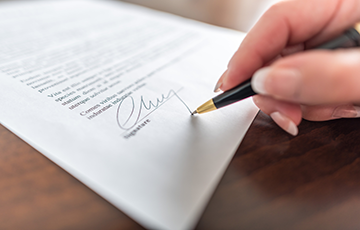
Legal Implications When You Back Out of a Real Estate Transaction
As house prices in the GTA reached record highs, the real estate market has been under stress and scrutiny due to a combination of new federal stress tests, mortgage qualification criteria, foreign homebuyer’s tax, and rising interest rates. As a result, there has been a noticeably higher rate of buyers backing out of deals months after having their offers accepted and deposits submitted.
An agreement to buy a home is a legally binding contract. Once the buyer and seller have signed the purchase agreement and the conditions have been satisfied, both parties must abide by the contract. There is typically not much leeway to cancel a real estate purchase. In most Ontario real estate transactions there is no cooling-off period, which means there is no guaranteed cancellation period without penalty if you change your mind. No matter the scenario, walking away at closing after you sign a purchase agreement can have significant legal and financial consequences. If a buyer pulls out of a house sale after contracts have been exchanged, they will forfeit their deposit and may be liable for other costs incurred by the seller.
The Risks of Backing Out of a Deal at Closing
The buyer may have to forfeit the deposit they submitted with their offer. Not only do they lose their deposit, but they are also at risk of being sued by the seller for money they have lost on the sale of their home for loss in the value of their property on resale. Additionally, the buyers may also be responsible for the seller’s legal fees, mortgage carrying costs, and any other losses the seller suffered.
Once the buyer backs out and, if the seller eventually sells their home for a lower price, the seller may sue for the difference in price. For instance, let’s say there was an agreement to purchase the house for $1,000,000, and the buyers backed out of the deal, the home then goes back on the market and the best offer the seller receives is $750,000. As a result, the sellers may sue the previous buyers who breached the agreement for the loss they incurred – in this case, that is $250,000.
In Gamoff v. Hu, 2018 ONSC 2172, the purchasers made an offer of $2.25 million on a property that was listed at $2 million. Unfortunately, the purchasers subsequently learned that, through a combination of their approved mortgage financing and assessed value of their home, they would not be able to obtain the necessary financing to close on the Agreement of Purchase and Sale. The sellers relisted the property and managed to resell it for $1.77 million, which was substantially less than what the previous buyers had offered and led the sellers to file a civil suit. As a result, the buyers lost their $30,000 deposit, and they were ordered by the Ontario Superior Court of Justice to pay $470,000 in the lost value after they backed out. This decision outlines the harshness of legal consequences when parties renege on a real estate deal. This case is a reminder that purchasers should obtain, not only real estate advice, but legal and financial advice as well in order to manage their risk when getting on the roller coaster ride of the residential real estate market.
Legal Ways of Backing out of a Real Estate Transaction
There are a few legal ways to back out of a deal. The first is if the sale was conditional and the conditions were not met. It could result from a significant issue in the home inspection, a low appraisal, or the inability of the buyer to sell their current home. Regardless of the reason, the deal dies automatically if the conditions are not fulfilled.
Additionally, an agreement could become null and void for reasons outside the contract’s conditions. Common issues that can end a deal are a lien on the home, substantial damage to the property before closing, or if the buyer can prove that the seller knowingly misrepresented the property in a significant way.
Avoiding the Risks of Backing Out at Closing
It is important to purchase reasonably and not in a heated market with a long closing. If the market changes, and values go down, the property may not appraise and the buyer will need to make up the difference.
Furthermore, selling your current property first helps dictate what you can afford to spend on your next house. But the situation is less certain when you buy first.
Lastly, discuss the situation with your lawyer, consult a financial advisor and consider getting a mortgage pre-approval, to help ensure that you add the right conditions to your Agreement of Purchase and Sale before signing.
With Canadian housing prices falling from the pandemic’s all-time highs, a greater number of real estate deals seem to be falling apart. While there can be valid reasons for needing to back out, it’s a decision that can have serious financial consequences for buyers and sellers alike.
Article courtesy of Mills & Mills LLP
